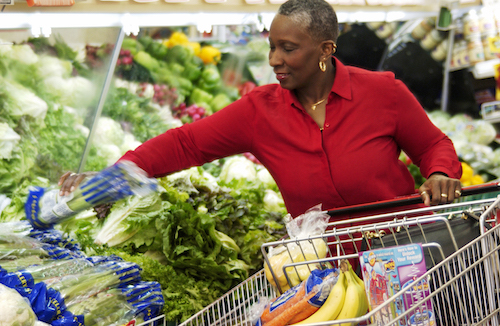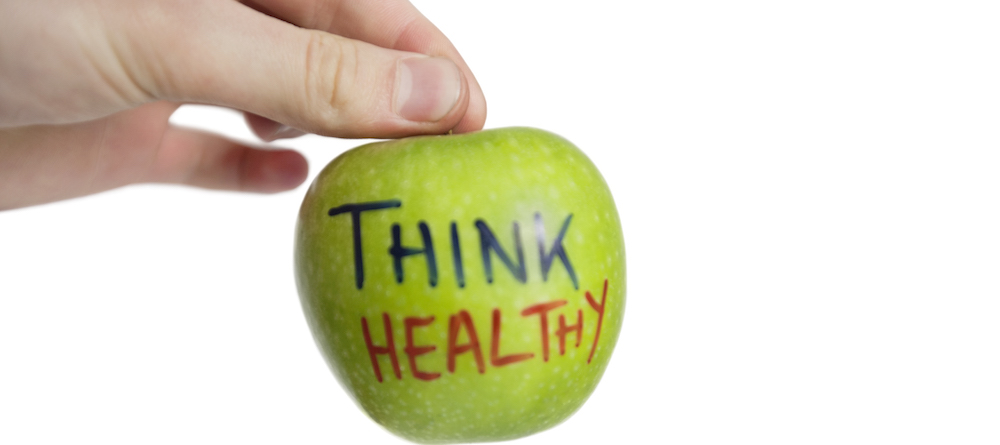Benefits of a Healthy Diet
What is a healthy diet?
A healthy diet centers around plenty of vegetables, fruits, and whole grains. Try to eat at least 2-½ cups of vegetables and fruit each day. Make a habit of buying whole grain bread, unsweetened and whole grain cereals and whole grain pasta. Limit processed foods, like potato chips and cookies. Avoid sugary drinks, instead drink water or plain tea or coffee. Try drinking at least 8 cups of water a day. Visit the meal plan section for more ideas on what your diet should look like.
Eat a healthy diet and reap the many benefits. Here are a few…
Eating healthy:

Helps you feel good!
Food fuels your body. Healthy foods, like vegetables, provide your body with the nutrients it needs to function at its best. Eating healthy foods will give you more pep!
Helps you achieve a healthy weight.
Foods that contain a lot of water and fiber take-up more room in your stomach. Eat more vegetables, fruits and broth-based soups, these foods will help you feel full faster. Whole grain breads and cereals take more effort to chew.
If you don’t feel hungry, you’ll eat less.
---TAILORING---
[If has breast cancer] Helps fight breast cancer.
Breast cancer is linked to being overweight. If you consume high volumes of food and alcohol you increase your risk.
[If has cervical cancer] Helps fight cervical cancer.
Cervical cancer is linked to not eating enough vegetables. Green leafy vegetables, like spinach, can help fight cancer.
[If has colorectal cancer] Helps fight colorectal cancer.
Colorectal cancer is linked to being overweight. Diets that are high in fat (especially saturated fat from animal products), red meat, and alcohol increases your chances of colorectal cancer. A diet with plenty of vegetables and fruits is linked to a lower risk of colorectal cancer.
[If has kidney cancer] Helps fight kidney cancer.
Kidney cancer is linked to obesity. Eating a lot of red meat, mainly foods that are fried, burned, and charred will increase your chances of getting kidney cancer.
[If has liver cancer] Helps fight liver cancer.
Liver cancer is linked to drinking a lot of alcohol.
[If has lung cancer] Helps fight lung cancer.
Lung cancer is mostly due to smoking, but it also is linked to diets that are low in vegetables and fruits.
[If has ovarian cancer] Helps fight ovarian cancer.
Some studies show that ovarian cancer is linked to diets high in dairy products, but more research is needed. Striving for a healthy weight might be the best way to lower risk for this cancer.
[If has pancreatic cancer] Helps fight pancreatic cancer.
Pancreatic cancer is linked to overweight and obesity.
[If has prostate cancer] Helps fight prostate cancer.
Eating a lot of fat, especially the saturated fat from red meat increases your chances of prostate cancer. Men who are overweight or obese have a greater chance of having more aggressive prostate cnacer.
[If has stomach cancer] Helps fight stomach cancer.
Eating foods that are preserved with salt, like ham, bacon, sausage and pickles increases your chances of stomach cancer.
Helps control or prevent diseases such as diabetes, high blood pressure, heart disease, stroke, osteoporosis, osteoarthritis, gallbladder disease, and some cancers.
Eat a healthy, well balanced diet and you will reduce your chances of getting type 2 diabetes, high blood pressure, and heart disease. If you already have these conditions, eat a diet with lots of vegetables and it will help you better manage your health. Getting your weight under control is very important.
These conditions are all diet-related. Control your weight, by trimming the fat, especially the fat from meat and high fat dairy foods and you will lower your risk of stroke, heart, and gallbladder disease, and some cancers. Osteoarthritis and other joint problems can be caused by inflammation. Try substituting fish for meat, and eat more vegetables and fruit and see if these diet changes will help you move better? Many cancer treatments cause brittle bones. Prevent osteoporosis by walking more and eating low-fat dairy foods (your body will absorb much more calcium from skim milk, than whole milk).
Helps you feel less bloated and less tired—you’ll have more pep!
High fat foods stick in your stomach a long time – they can make you feel bloated and sluggish. Lighten-up by eating more vegetables and fruits.
Helps keep your bowels regular.
Vegetables, fruits and whole grains contain a lot fiber. A fiber rich diet will help you have regular bowel movements and prevent constipation. Remember to drink a lot of water too!
Provides your body with the nutrients it needs to recover and stay healthy
Many unhealthy foods have little or no nutritional value. Try to limit sugar, regular soft drinks, most desserts, and snack foods since they contain few nutrients and a lot of calories. Healthy foods, like vegetables, contain lots of vitamins and nutrients needed for good health, and are also low in calories.
Moderation Is the Key!
Everyone has favorite foods that aren’t very healthy. It’s okay to eat those foods… sometimes (like once a week). It’s important to balance out these “sometimes” foods with healthy, everyday foods (like fruits and vegetables). Remember, every time you eat, you are making a choice: Do you want to eat healthy and help your body fight cancer? Only you can decide.
